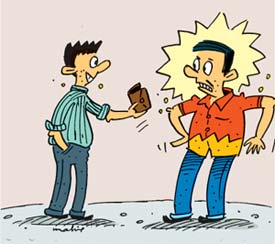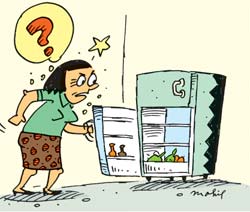|

More on relative clauses
Recently we explained what a relative clause is. Today too we like to
familiarise you with it.
A clause is a part of a sentence. A relative clause therefore is a
part of a sentence that tells us which person or thing is referred to.
Let us have a look at some of the relative clauses.
The girl who is wearing a blue skirt
is my sister.
|

Is this the wallet you are looking for? |
The novels that he writes do
not sell.
Where is the cake that was in the
fridge?
Do you know the name of the horse
which won the race?
A dictionary is a useful book which
helps us to know the meaning of words.
As you can see, when we use ‘who’ in
a relative clause we refer to people, not things. In other words, we use
‘who’ instead of ‘he, she, they.’
The girl who answered the phone
told me that you were on leave.
Shakespeare was the dramatist who
wrote ‘The merchant of Venice.’
The security forces are looking for the terrorists
who attacked the cricketers.
Some people who were arrested
have been released.
Can you identify the thief who stole
my car?
A customer who is dissatisfied
will not come back to the same shop.
She is a tenant who pays her rent
on time.
Instead of using ‘who’ we can also
use ‘that’ in relative clauses.
The gentleman that lives next door
is a surveyor.
What happened to the workman that
built our house?
|

Where is the cake that was in the
fridge? |
The lawyer that is appearing for me
is an old friend of mine.
When we refer to things we use ‘that’
or ‘which’ in relative clauses.
Sena does not like films that (or
which) have unhappy endings.
I worked for a company that (or
which) prints and publishes newspapers.
The vehicles that (or which)
broke down have to be repaired soon.
The building that (or which)
was used by war victims has crumbled down.
The train that (or which) goes
to Kandy is half an hour late.
Sometimes, we leave out ‘who, that,
which’ in relative clauses.
Is this the wallet you are looking for?
The officer I wanted to meet was away on holiday.
Have you found the book you lost yesterday?
Is there anything I can do for you?
The people I live with are very cooperative.
Fun with
proverbs
By using proverbs you can put your ideas across to others in a
delicate manner. Some of the proverbs carry strong messages and advice.
Be familiar with the following proverbs.
Absence makes the heart grow fonder
When two friends are separated for sometime they begin to miss each
other.
Actions speak louder than words
Many people, notably politicians, make tall promises, but fail to
fulfil them. Therefore, we respect those who deliver the goods rather
than those who only talk.
Adam’s ale
Legendary Adam had only water to drink. All the other
drinks - tea, coffee, cola and wine came very much
later. So, water is called Adam’s ale!
All roads lead to Rome
Rome was the commercial capital of ancient Europe. As a result, those
who did business came to Rome from different directions. Today the
proverb means that manydifferent methods can be used to achieve a
certain goal.
All that glitters is
not gold
Certain items look beautiful, but they may not have any value.
Therefore, do not be carried away by the outward appearance.
All’s fish that comes
to the net
Make use of whatever that comes your way. Sometimes we tend to reject
opportunities thinking that they are useless and repent later.
Call a spade a spade
If you call a spade a spade, you give an honest opinion about
something or someone. However, many people donot do so and hide their
true feelings for various reasons.
Cast pearls before
swine
Swine is another word for pigs. We cannot expect pigs to know the
value of pearls. Similarly, some people simply cannot understand the
value of learning, literature or drama.
Catch as catch can
This simply means that people use any means to achieve an object.
Catch your bear before
you sell its skin
Do not make plans until you know the results of something. In other
words, do not put up a dispensary until you become a doctor!
Catch at straws
When you are in trouble you resort to anything to save yourself. For
example, Prabhakaran is clutching at straws!
Charity begins at home
First look after your own family before being charitable to others.
Many engage in doing charity work while neglecting their parents or
needy relatives. |


